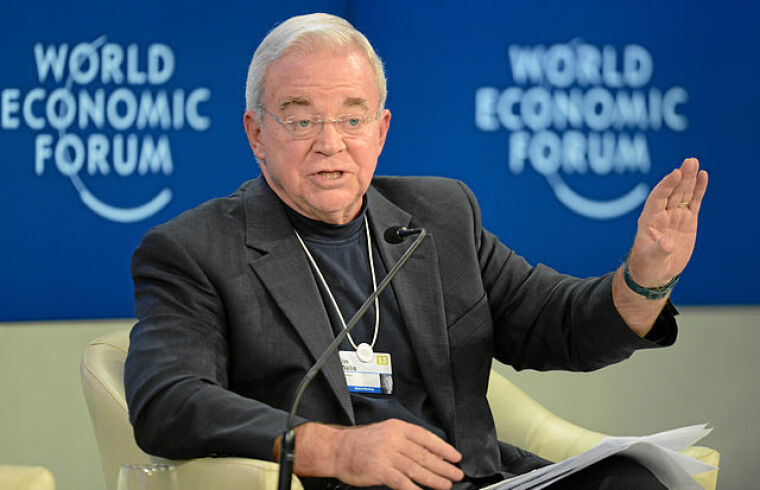White Evangelicals supporting Trump represents 'crisis in the church,' says Jim Wallis

Rev. Jim Wallis, who heads the progressive Christian social justice group Sojourners, has said that the evangelical voters and white Christians who supported President Donald Trump in the 2016 election represent a "crisis in the Church."
In an interview with The Christian Post on Wednesday, Wallis said that the evangelicals and Christians who voted for Trump are "responsible" for any "racist" policies that would come out of the current administration.
Wallis, who released a paperback version of his book "America's Original Sin" on Tuesday, said that the Trump campaign relied on the stoking of "racial bigotry" to win the presidency.
The exit polls have revealed that Trump had the support of 81 percent of evangelical voters, 60 percent of Protestant voters, 52 percent of Catholic voters and 55 percent of "other Christian" voters, while Hillary Clinton gained the support of 88 percent of black exit poll respondents and 65 percent of Latino respondents.
Wallis explained that Trump relied on racial bigotry in starting his career by denouncing immigrants and referring to them as rapists and criminals.
He denounced Trump's call for "law and order" and "stop-and-frisk" policing, saying it would lead to even more "racial profiling" than what already exists. He also decried the selection of Jeff Sessions as attorney general for his anti-immigration stance.
"Here is the deal. White evangelicals voted for Donald Trump. Now they have him and are responsible for him," Wallis said.
"And he is pursuing policies that are overtly racist. So, what are white Christians going to do about that? There has never been such a racial divide in the church in my lifetime than what I see now. Black evangelicals I know don't even want to speak to white evangelicals because they voted for Donald Trump," he added.
While some conservatives and Christians were hesitant to support Trump, many voted for him because of his promise to protect religious liberties, defund Planned Parenthood and appoint pro-life Supreme Court justices.
On the other hand, there was a very little chance that conservative Christians would vote for Clinton due to her support for late-term and partial-birth abortion.
Wallis contended that it would have been acceptable for evangelicals to vote for a third-party or independent candidate. He pointed to Ethics & Religious Liberty Commission President Russell Moore, who suggested that it is acceptable for Christians to support a third-party candidate when faced with a choice between "two evils."
Wallis said that Trump's election presents an opportunity for the nation and the Church to have a concrete discussion about race that arguably would not take place if Clinton had been elected. He asserted that the U.S. would no longer be a "white nation" by 2040 and said that white Christians should be the ones to start saying that diversity is a "blessing and is God's intention."
 Christians don't have to affirm transgenderism, but they can’t express that view at work: tribunal
Christians don't have to affirm transgenderism, but they can’t express that view at work: tribunal Archaeology discovery: Medieval Christian prayer beads found on Holy Island
Archaeology discovery: Medieval Christian prayer beads found on Holy Island Presbyterian Church in America votes to leave National Association of Evangelicals
Presbyterian Church in America votes to leave National Association of Evangelicals Over 50 killed in 'vile and satanic' attack at Nigerian church on Pentecost Sunday
Over 50 killed in 'vile and satanic' attack at Nigerian church on Pentecost Sunday Ukrainian Orthodox Church severs ties with Moscow over Patriarch Kirill's support for Putin's war
Ukrainian Orthodox Church severs ties with Moscow over Patriarch Kirill's support for Putin's war Islamic State kills 20 Nigerian Christians as revenge for US airstrike
Islamic State kills 20 Nigerian Christians as revenge for US airstrike Man who served 33 years in prison for murder leads inmates to Christ
Man who served 33 years in prison for murder leads inmates to Christ


 Nigerian student beaten to death, body burned over ‘blasphemous’ WhatsApp message
Nigerian student beaten to death, body burned over ‘blasphemous’ WhatsApp message 'A new low': World reacts after Hong Kong arrests 90-year-old Cardinal Joseph Zen
'A new low': World reacts after Hong Kong arrests 90-year-old Cardinal Joseph Zen Iran sentences Christian man to 10 years in prison for hosting house church worship gathering
Iran sentences Christian man to 10 years in prison for hosting house church worship gathering French Guyana: Pastor shot dead, church set on fire after meeting delegation of Evangelicals
French Guyana: Pastor shot dead, church set on fire after meeting delegation of Evangelicals ‘Talking Jesus’ report finds only 6% of UK adults identify as practicing Christians
‘Talking Jesus’ report finds only 6% of UK adults identify as practicing Christians Mission Eurasia ministry center blown up in Ukraine, hundreds of Bibles destroyed: 'God will provide'
Mission Eurasia ministry center blown up in Ukraine, hundreds of Bibles destroyed: 'God will provide' Church holds service for first time after ISIS desecrated it 8 years ago
Church holds service for first time after ISIS desecrated it 8 years ago Burger King apologizes for 'offensive campaign' using Jesus' words at the Last Supper
Burger King apologizes for 'offensive campaign' using Jesus' words at the Last Supper Uganda: Muslims abduct teacher, burn him inside mosque for praying in Christ’s name
Uganda: Muslims abduct teacher, burn him inside mosque for praying in Christ’s name